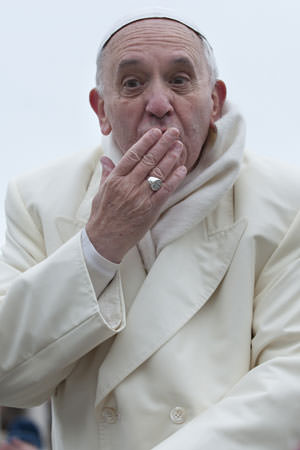The Pope Isn’t a Party Boss
President Obama's first salary as a community organizer was paid by a Catholic group and his earliest social justice work was rooted in Catholic social doctrine. So why don't the bishops like him?
President Obama’s first salary as a community organizer was paid by a Catholic group and his earliest social justice work was rooted in Catholic social doctrine. He identified with Cardinal Joseph Bernardin, then Chicago’s archbishop, whose consistent ethic of life encompassed a dedication to the poor, a concern over the human costs of war, and opposition to the death penalty.
You could thus imagine the president asking Pope Francis at their meeting on Thursday: Why can’t these American bishops get along with me? Or, perhaps more humbly: Holy Father, what can I do to make these guys happy?
It is a sign of how politicized the American Catholic Church has become that its different factions were lobbying hard over the message the bishop of Rome should send after meeting with the president of the United States.
Catholic conservatives hope Francis will again condemn abortion by way of upbraiding the pro-choice Obama. They’d like strong language supporting the campaign spearheaded by the more conservative bishops against the contraception mandate in the health care law.
Catholic progressives look for Francis to push the president to move more forcefully against poverty and inequality, around the world and not just at home. They want some of the pope’s searing criticisms of global capitalism by way of reminding Obama that the Catholic Church is well to his left on economic matters.
Both sides, in other words, want Francis to bless their own positions inside the American Catholic struggle. The progressives believe they now have a friend in Rome and conservatives worry the progressives might be right. After all, as Michael Sean Winters pointed out in the National Catholic Reporter, “the American bishops who are most aggressively hostile to Obama are also the American bishops who have been most resistant to Pope Francis.”
But this meeting will also underscore something else: While Francis has decidedly moved the church back toward the social justice Catholicism that Obama connected with as a young man, Francis’ worldview is plainly not American. Efforts to shoehorn him into our debates will always have a distorting effect. And the Vatican — which itself is divided into factions — has other things to think about besides the contention within the American church.
From everything he has said, Francis is, in our terms, a social conservative. Yet the issues about which he feels a genuine sense of urgency involve the hundreds of millions around the globe who suffer from extreme deprivation and oppression. From this standpoint, the political and theological skirmishes that consume so much energy among believers in wealthy countries might seem a form of self-indulgence.
The Vatican will not leave conservative American bishops out in the cold in their contraception battle. But it’s difficult to see Francis joining them at the ramparts. The veteran Vatican correspondent John Allen has documented attacks on religious liberty from state-sponsored persecution, including the outright murder of Christians. In light of this, the American uproar over a requirement that contraception be subsidized in health insurance policies seems disproportionate. That’s especially true since the government-led health systems in many predominantly Catholic countries routinely cover contraception.
As for foreign policy, the Vatican has an approach of its own. It has often found itself allied with Obama — for example, on his quest for Middle East peace — but has also opposed him, as when he threatened military retaliation for Syria’s use of chemical weapons. Conservatives have ignored or downplayed the Vatican’s relative dovishness, except when it provided them with another club to use against Obama.
But this highlights the larger truth that Francis defies many currents of American thinking. Francis is anti-consumerist and anti-materialist. That is quite at odds with an American ethos that turns the mall into a religious shrine and shopping into a sacrament. The pope preaches a code of sacrifice that is not widely celebrated in our society outside the realm of military combat. He extols the simple life, a value popular in sections of the environmental movement, but not a big seller in a country obsessed with stuff and gadgets.
It would be good if Francis encouraged the parts of the American Catholic leadership most alienated from the president to stop treating this former church employee as an enemy. But the pope’s main job is to pose a radical challenge to our complacency and social indifference. In doing so, he should stir an uneasiness that compels all of us — and that includes Obama — to examine our consciences.
E.J. Dionne’s e-mail address is ejdionne(at)washpost.com.
© 2014, Washington Post Writers Group
Your support matters…Independent journalism is under threat and overshadowed by heavily funded mainstream media.
You can help level the playing field. Become a member.
Your tax-deductible contribution keeps us digging beneath the headlines to give you thought-provoking, investigative reporting and analysis that unearths what's really happening- without compromise.
Give today to support our courageous, independent journalists.






You need to be a supporter to comment.
There are currently no responses to this article.
Be the first to respond.